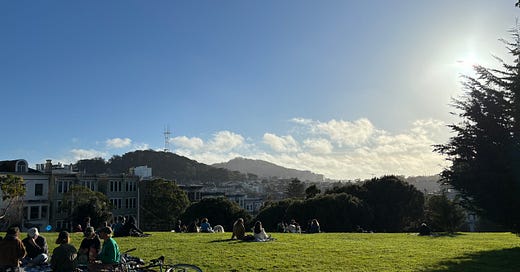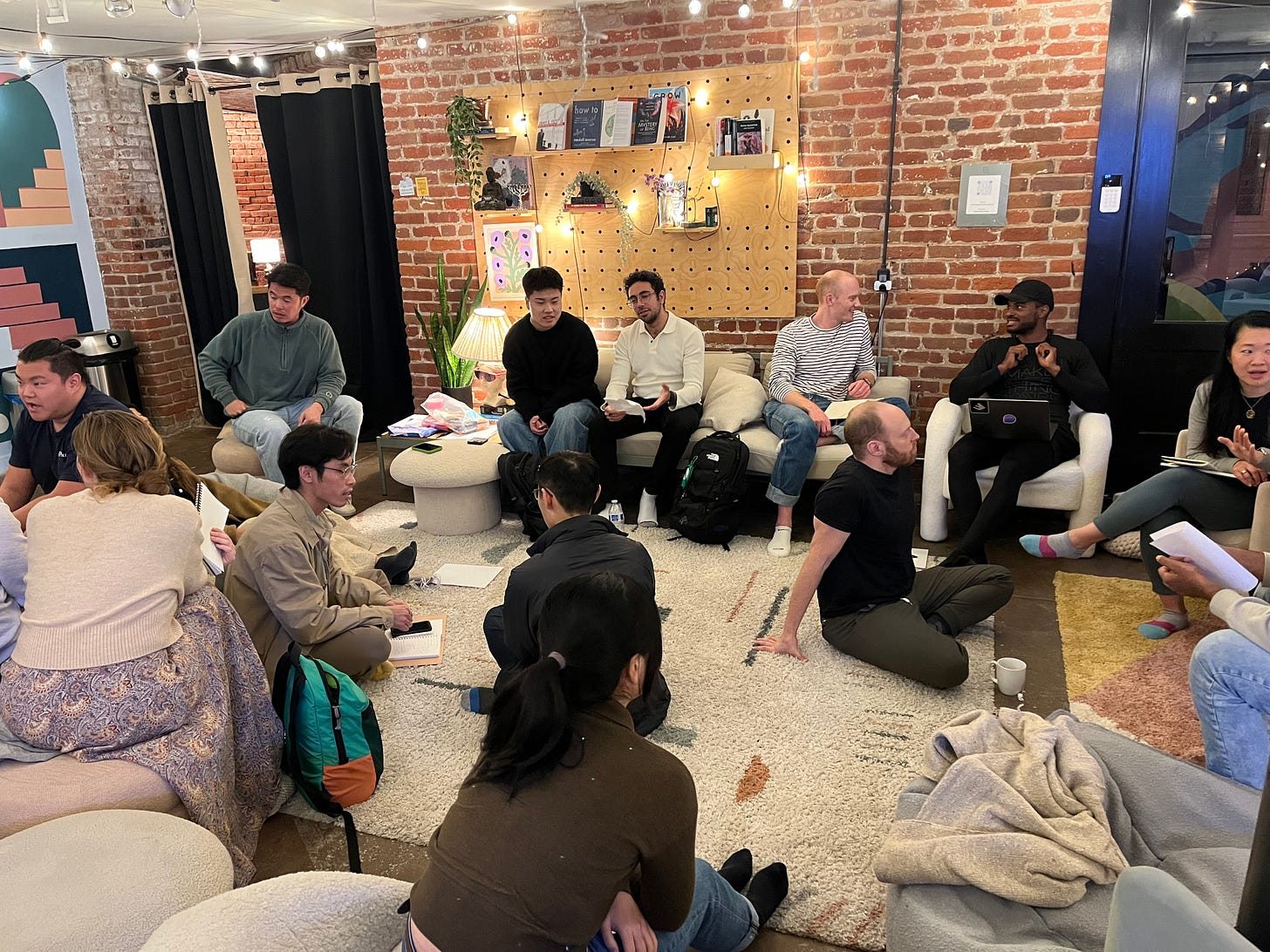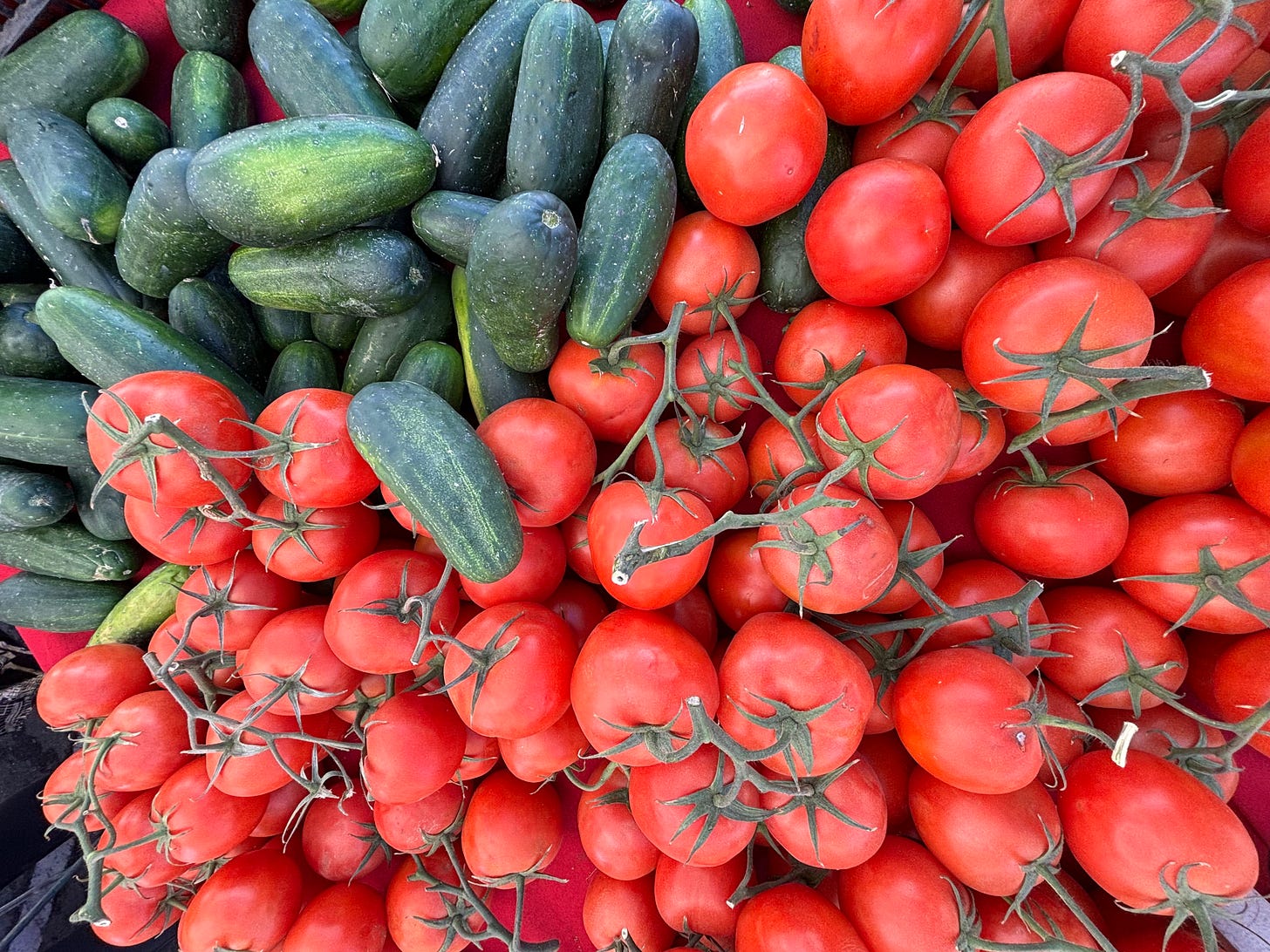Monthly Musings: March edition
a 3-day meditation retreat, tech sabbaths, and farmers markets
Welcome to the first edition of Monthly Musings! In addition to my weekly-ish essays, I’m experimenting with a new format where I share experiences that shifted my perspective and what I’ve been up to each month.
Let me know in the comments how this first edition resonates!
on the ways we entrap ourselves in pursuit of freedom
A few weeks ago, I went on my first 3-day meditation retreat. It'd been seven months since my first 10-day retreat. Unlike last time, I largely knew what to expect. I was ready and excited to recommit to my practice.
As I settled into a simpler way of living where my days followed a strict daily schedule, I was reminded of how little we need to feel whole. Each day, I lived by meditating, eating, walking, and sleeping — and around me, time began to expand.
As noble silence was enacted and the number of people I spoke to fell to zero, I was free to be in the presence of others while moving about my day with full intention.
As the number of things I did each day decreased, I was free to embody the spaciousness of time and lose myself in the minutes and hours, unaware of whether it was Thursday or Saturday. Either way, it made no difference.
As the number of decisions I made each day plummeted, I was free to live each moment fully present and tend to my inner landscape rather than contemplate the next micro decision.
In a world where we strive to maximize optionality, what if the freedom we seek through accumulation is actually found on the other side of simplicity? Perhaps freedom isn’t about having infinite optionality in everything, but rather in the things most meaningful to us. Abundance not in gadgets, TV shows, and material goods, but in time and in space to live our lives to their fullest potential.
We often confuse motion with progress and yet, in those three days, it couldn’t have been clearer to me that it’s in stillness where the answers we’re seeking lie. It’s only once we’ve become still that we can ground into our truth and move more swiftly towards progress that matters.
on the role of personal and communal responsibility in flourishing
As part of the work I’m spearheading in redefining human flourishing in the 21st century, I hosted the first of a series of Flourishathons. For an afternoon, we brainstormed and designed social experiments.
Rather than be bound to the limitations of the systems that aren’t designed to help us thrive, this effort is about organizing experiments within our communities and using our lives as petri dishes in pursuit of advancing our collective well-being.
The act of flourishing begins with self-knowledge. The first step is doing the work to rise above the noise and societal pressures we get swept up in and reconnect with ourselves.
One experiment that emerged from the session was a tech sabbath.
tech sabbath
Borrowing elements of the Sabbath from Judaism and Christianity, the purpose of a tech sabbath is to put technology down for 24 hours (from sundown Friday to sundown Saturday) — to invest time in being more human and return to our bodies after the work week. What insights might emerge within us when we disconnect from the central thing that’s kept us on all week?
Tactically, Friday evening kicks off with a dinner and a group commitment to no technology (phones, computers, tablets, kindles, smart watches). On Saturday, we plan events where the group can spend time together like trips to the Farmers Market, a field day in Golden Gate Park, or a hike along the coast.
The intention of this experiment is not about giving up technology altogether. It’s about pressure testing our belief systems around how much time we need to be plugged in, giving our minds a day to wander freely and see the forest for the trees.
By offering our other sources of meaning our full attention and releasing ourselves from the questions we’re grappling with at our desks or from mindlessly scrolling in search of connection, we can ground into the grander context of our existence and make space for ourselves to do our best work when we return.
on meeting the farmers and families who grow our food
A few months ago, Irena Spegar from The Boonly, a newsletter that spotlights how we can all make Sundays more joyful, reached out to ask me about how I spend my Sundays. I was amidst a move to our new apartment and in search of ways to redesign what our weekends looked like as we established our new routine.
The first thing that came to mind was how I shop for my food. When I reflect on the evolution of how I shop for groceries, I think back to a time pre-2020 when I would have never considered ordering produce online and having it shipped to my front door. While I appreciate how convenient it’s become to order groceries, I’ve had an intention to shop locally for years now. As we settled into a place more central to the farmers markets across town, it felt like a good time as any to finally swing by the local markets.
As I’ve visited farmers markets and supplemented with big box grocers, I’ve developed a far greater appreciation for where my food comes from and a sense of satisfaction knowing that my dollars go towards supporting Californian farmers and families.
Turns out, there’s something deeply humanizing about talking to the family that spent their week harvesting the fruits and vegetables they're weighing for me as I check out. And surprisingly, I often save money buying fresher produce. 3 large pomelos for $5?!
Check out a feature on how I spend the rest of my Sundays in a recent edition of The Boonly.
seeking book recommendations
I’m gearing up for a trip back to China after nearly a decade and for the first time since I’ve done meaningful inner work around my identity as a Chinese American woman, a part of me that lived in the shadows for a very long time. I’m excited (and nervous) to embark on what feels like the beginning of my roots journey.
I’ve got a 13-hour plane ride to look forward to and would love to fill my time with good books. What are your favorite books that you return to over and over again or new books that have stretched the bounds of your mind? Share ‘em in the comments :)
March essays
Thanks to Ryan for reviewing a draft of this piece.









A Way Forward by Yung Pueblo . The Worlds I See by Dr. Fei Fei Li.
Hi Cissy! Two book recommendations for you - The Paper Menagerie & Other Stories by Ken Liu (I absolutely loved this collection of short stories - lots of magical realism / fantasy / sci-fi) + Sour Heart by Jenny Zhang (Asian-American girlhood!)